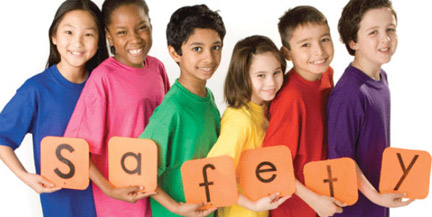|

Pic: betterkidsinstitute |
Saying 'be careful' makes a difference
by Rachel Grumman Bender
You may think it's falling on deaf ears when you tell your kid to "be
more careful next time" after a bad fall or a negative surprise
altogether, but a new study that looked at parent-child conversations
about safety suggests otherwise.
Researchers found that conversations parents have with their children
after a serious injury, explaining why the activity was dangerous, helps
kids internalize safety values and may help them be more careful in the
long run.
"Early on, parents use supervision to keep their kids safe,"
Elizabeth E. O'Neal - study author and a Ph.D. candidate in the
Department of Psychological and Brain Sciences at the University of Iowa
- tells Yahoo Parenting.
"As infants, they always have an eye on them. But as they get older,
supervision lessens by necessity because parents can't follow them
around all the time. So parents need to find a new way to keep kids
safe.
The researchers found that parents use several strategies to help
their kids avoid injuries, including explaining an alternative plan for
doing the same activity without getting hurt (like advising them to
walk, not jump, down the stairs) or simply telling them to be more
careful.
 The study also found that parents were more likely to explain why a
behaviour was dangerous if the child was older, starting around age 7. The study also found that parents were more likely to explain why a
behaviour was dangerous if the child was older, starting around age 7.
Parental authority
That's likely because parents feel an older child can better
understand why the activity is risky. However, O'Neal says children are
never too young to understand a simple explanation of why a behaviour is
dangerous. "When children are really young, parents might say, 'Don't
touch that,' but adding, 'Don't touch that - it's hot and it could burn
you' can help," she says.
The study also revealed some not-so-surprising gender differences.
Parents are four times more likely to tell their daughters to be careful
than their sons. "Boys are at greater risk of being injured than girls
are," notes O'Neal. "Parents often encourage boys to take risks, whereas
they don't as often with girls. But telling girls to be more careful
might contribute to these lower injury risks of girls."
No parent wants their child to get hurt, but on the flipside, being
overly protective isn't helpful either. "It's a fine line," she says.
"Kids have to push their limits of their physical abilities to learn
new skills, but girls aren't getting encouraged to do this as often."
If your kid does get hurt, having a conversation with him or her
about why that behaviour is risky and ways to avoid injuries in the
future can help.
Those safety messages do sink in over time. "Parents are really the
first line of defense when it comes to preventing injuries," says
O'Neal.
"The same way that parents install moral values in their children,
parents can work to install safety values, and one day you realize, 'Oh,
they get it!' Parents are teaching their children about what in their
surroundings could lead to injury, so that when kids are navigating a
new dangerous situation, they can think: "Maybe jumping from this tree
is not a good idea."
- Yahoo.com |

